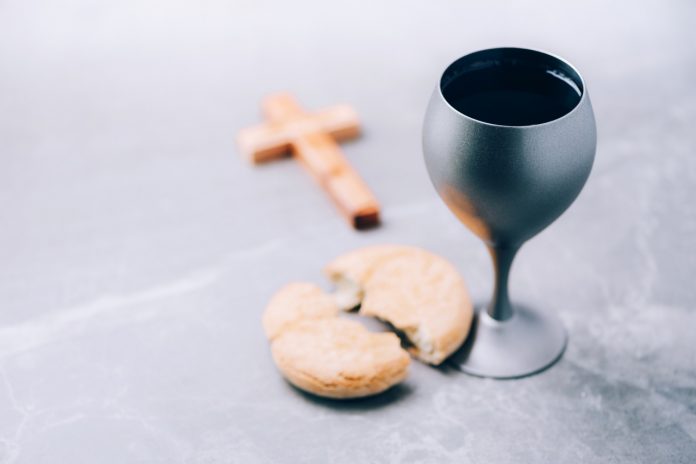In a letter to the leaders of the world’s episcopal conferences, the head of the Vatican’s office for worship and sacraments said that Catholic communities should return to Mass as soon as it can be done safely, and that the Christian life cannot be sustained without the Sacrifice of the Mass and the Christian community of the Church.
The letter, sent to bishops this week, said that, while the Church should cooperate with civic authorities and be attentive to safety protocols amid the coronavirus pandemic, “liturgical norms are not matters on which civil authorities can legislate, but only the competent ecclesiastical authorities.” It also emphasized that bishops can make provisional changes to liturgical rubrics in order to accommodate public health concerns, and urged obedience to those temporary changes.
“In listening to and collaborating with civil authorities and experts,” bishops and episcopal conferences “were prompt to make difficult and painful decisions, even to the point of suspending the participation of the faithful in the celebration of the Eucharist for a long period. This Congregation is deeply grateful to the Bishops for their commitment and effort in trying to respond in the best possible way to an unforeseen and complex situation,” Cardinal Robert Sarah wrote in Let us return to the Eucharist with joy, dated Aug. 15 and approved by Pope Francis Sept. 3.
“As soon as circumstances permit, however, it is necessary and urgent to return to the normality of Christian life, which has the church building as its home and the celebration of the liturgy, especially the Eucharist, as ‘the summit toward which the activity of the Church is directed; and at the same time it is the font from which all her power flows’ (Sacrosanctum Concilium, 10).”
Sarah noted that “as soon as is possible… we must return to the Eucharist with a purified heart, with a renewed amazement, with an increased desire to meet the Lord, to be with Him, to receive Him and to bring Him to our brothers and sisters with the witness of a life full of faith, love and hope.”
“We cannot be without the banquet of the Eucharist, the table of the Lord to which we are invited as sons and daughters, brothers and sisters to receive the Risen Christ himself, present in body, blood, soul and divinity in that Bread of Heaven which sustains us in the joys and labours of this earthly pilgrimage.”
We “cannot be without the Christian community,” Sarah added, “cannot be without the house of the Lord,” “cannot be without the Lord’s Day.”
“We cannot live as Christians without participating in the Sacrifice of the Cross in the which the Lord Jesus gave himself unreservedly to save, by his death, humanity which had died because of sin…in the embrace of the Crucified One all human suffering finds light and comfort.”
The cardinal explained that while streamed or televised Masses “have performed a great service…at a time when there was no possibility of community celebration, no broadcast is comparable to personal communication or can replace it. On the contrary, these broadcasts alone risk distancing us from a personal and intimate encounter with the incarnate God who gave himself to us not in a virtual way,” but in the Eucharist.
“One the concrete measures that can be taken to reduce the spread of the virus to a minimum have been identified and adopted, it is necessary that all resume their place in the assembly of brothers and sisters…and encourage again those brothers and sisters who have been discouraged, frightened, absent, or uninvolved for too long.”
Sarah’s letter made some concrete suggestions for the resumption of Mass amid the coronavirus pandemic, which is expected to continue to spread in the United States in the fall and winter months, with some models predicting a doubling of the death count by the end of 2020.
The cardinal said that bishops should give “due attention” to “hygiene and safety regulations” while avoiding the “sterilisation of gestures and rites” or “instilling, even unconsciously, fear and insecurity in the faithful.”
He added that bishops should be certain that civil authorities not subordinate the Mass to a place of priority below “recreational activities” or regard the Mass as only a “gathering” comparable to other public activities, and reminded bishops that civic authorities cannot regulate liturgical norms.
Sarah said that pastors should “insist on the necessity of adoration,” work to ensure the dignity of the liturgy and its setting, and ensure that “the faithful should be recognized as having the right to receive the Body of Christ and to worship the Lord present in the Eucharist,” without “limitations that go even beyond what is provided for by the norms of hygiene issued by public authorities.”
The cardinal also seemed to address, indirectly, an issue that has been a matter of some controversy in the United States — prohibitions on reception of Holy Communion on the tongue amid the pandemic, which seem to contravene a right established by universal liturgical law to receive the Eucharist in that manner.
Sarah did not specifically mention the issue, but he affirmed that bishops can give temporary norms during the pandemic, in order to assure safe sacramental ministry. Bishops in the U.S. and other parts of the world have temporarily suspended distribution of Holy Communion on the tongue.
“In times of difficulty (e.g. wars, pandemics), Bishops and Episcopal Conferences can give provisional norms which must be obeyed. Obedience safeguards the treasure entrusted to the Church. These measures given by the Bishops and Episcopal Conferences expire when the situation returns to normal.”
“A sure principle in order not to err is obedience. Obedience to the norms of the Church, obedience to the Bishops,” Sarah wrote.
The cardinal urged Catholics to “cherish the human person as a whole.”
The Church, he wrote, “bears witness to hope, invites us to trust in God, recalls that earthly existence is important, but much more important is eternal life: sharing the same life with God for eternity is our goal, our vocation. This is the faith of the Church, witnessed over the centuries by hosts of martyrs and saints.”
Urging Catholics to entrust themselves and those afflicted by the pandemic to God’s mercy and the intercession of the Blessed Virgin Mary, Sarah urged bishops to “renew our intention to to be witnesses of the Risen One and heralds of a sure hope, which transcends the limits of this world.”















